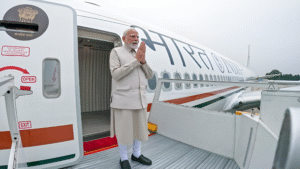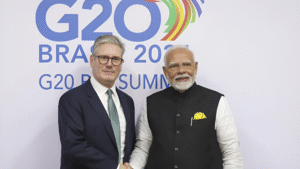
The impending signing of the free tread agreement(FTA)between India and the united kingdom on July 24 in London marks a defining moment in India’s evolving trade policy. Against a backdrop of rising protectionism and a fragmented global trade environment, this pact symbolizes a strategic effort by both nations to deepen bilateral ties and stimulate economic growth.
One of the most significant achievements for India under the FTA is the preferential access it gains for its exports. Nearly 99% of Indian goods exported to the United Kingdom will now attract zero duties, drastically improving competitiveness across several sectors. This is a major win, especially for key Indian industries such as engineering goods, apparel, and gems and jewellery — all of which are currently leading contributors to Indian exports to the United Kingdom. Industry bodies have responded with optimism. For instance, the Engineering Export Promotion Council of India estimates that engineering exports alone could nearly double to $7.55 billion by 2029-30.
Overall, bilateral trade between India and the UK projected to surge to $120 billion by 2030, nearly doubling from current levels. The FTA also introduces provisions to enhance mobility for Indian professionals and investors, which could play a role in revitalizing India’s declining foreign direct investment (FDI) levels.
Another landmark clause is the social security exemption for Indian workers temporarily employed in the United Kingdom. For a period of up to three years, both workers and their employers will be exempt from social security contributions. This measure is expected to ease hiring processes and lower the cost burden on businesses employing Indian talent in the United Kingdom.
However, the agreement is not without trade-offs. India has committed to lowering tariffs on 90% of UK-origin goods, with 85% of tariff lines being reduced to zero within a decade. While some of these tariff reductions — such as those on automobiles — may have limited impact due to India’s price-sensitive market, others like the slashing of import duties on whiskey and gin could increase competition for domestic producers and slow the momentum of premiumisation in India’s alcoholic beverage market.
Balancing Promise and Pitfalls: India-United Kingdom FTA as a Test Case for Future Trade Strategy

Critics have pointed out a potential contradiction in the Modi government‘s stance. While it has often criticized the previous United Progressive Alliance (UPA) administration for signing trade deals that allegedly disadvantaged Indian interests, some of its own FTAs — like the 2022 India-UAE Comprehensive Economic Partnership Agreement (CEPA) — have led to Un Favorable trade balances. The India-Australia FTA has similarly underperformed in terms of boosting Indian exports.
Indian farmers’ organisations remain vocal opponents of the deal, particularly objecting to lower tariffs on UK-sourced food products such as lamb and salmon. These groups fear the influx of cheaper imports could displace Indian agricultural producers already struggling with low margins and inadequate income. The government must remain vigilant and proactive in protecting their interests.
Perhaps most significantly, the India-UK FTA is seen as a potential blueprint for future trade agreements with larger economies like the European Union and the United States. These forthcoming negotiations will carry greater strategic and economic weight. Given India’s current contribution of less than 2% to global exports, any future trade liberalisation must be carefully calibrated to strengthen — not undermine — its domestic manufacturing base.

In essence, while the India-UK FTA offers promising opportunities, its true value will be measured by how well India balances openness with safeguarding national interests in the global arena.
